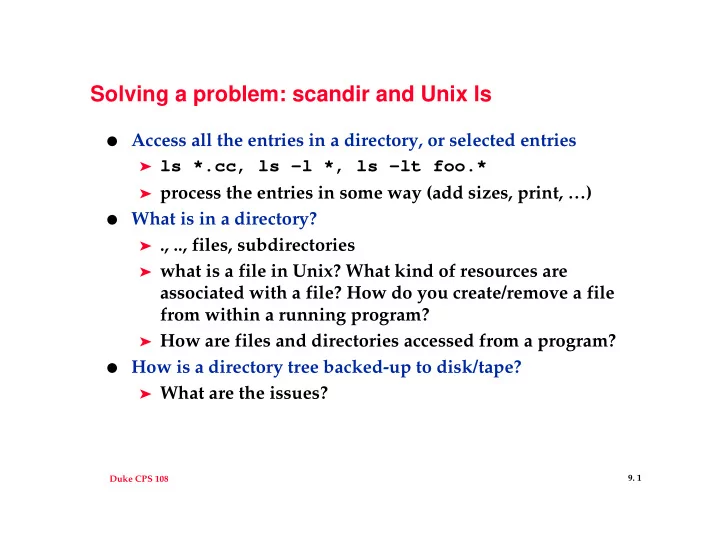

Solving a problem: scandir and Unix ls ● Access all the entries in a directory, or selected entries ➤ ls *.cc, ls -l *, ls -lt foo.* ➤ process the entries in some way (add sizes, print, …) ● What is in a directory? ➤ ., .., files, subdirectories ➤ what is a file in Unix? What kind of resources are associated with a file? How do you create/remove a file from within a running program? ➤ How are files and directories accessed from a program? ● How is a directory tree backed-up to disk/tape? ➤ What are the issues? 9. 1 Duke CPS 108
Solving another problem: search for words ● Web-based search engines ➤ Search for “Titanic” + “Linux” in Alta vista ● File-based search engines ➤ What’s the file that has the reference to “elephants”? ● What are the issues in the searches? ➤ User’s perspective ➤ Programmer’s perspective ● What about approximate matches ➤ search for “pincake” or “pancake” or “pancakes” or … ➤ are approximate/fuzzy matches a good idea? 9. 2 Duke CPS 108
Coping with transferable ownership ● Factory creates a class, who deletes it? Foo * f = FooFactory::makeFoo(); f->doFooStuff(); delete f; ➤ Why might this be a problem? What are alternatives? ● Instead of using a Foo pointer, use a proxy, a class that stands in for a Foo pointer ➤ looks like a Foo pointer, acts like a Foo pointer, but cleans up after itself (SmartStrings in sortall/cps 100): heap vs. stack allocation FooProxy f(FooFactory::makeFoo()); f->doFooStuff(); 9. 3 Duke CPS 108
Program parameters and errors ● What are alternatives to large if/else chains to process argc and argv? ➤ What are argc/argv used for? ➤ What helper functions cope with arg parsing? ➤ What’s wrong with if (argv[k] == “-f”) ➤ Other options to getting info into program ● How do you signal an error condition? ➤ Files don’t open, times (wag) out of order, … ➤ cerr << ➤ other alternatives? 9. 4 Duke CPS 108
Recommend
More recommend